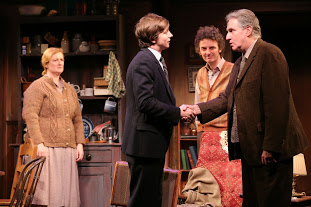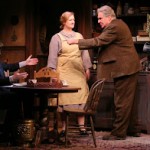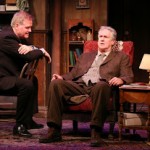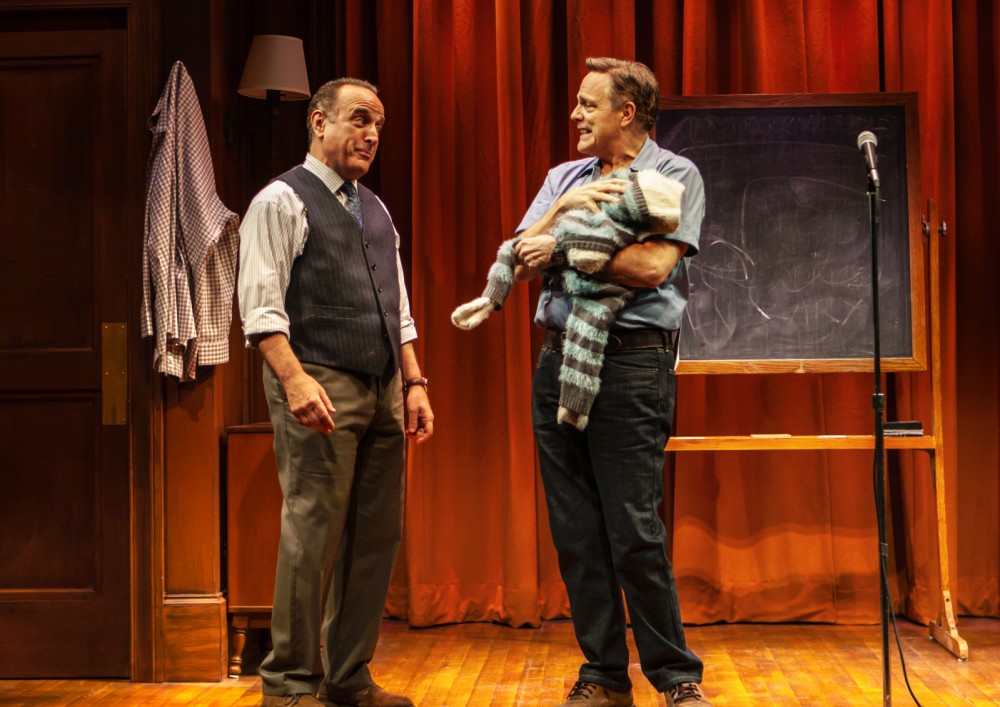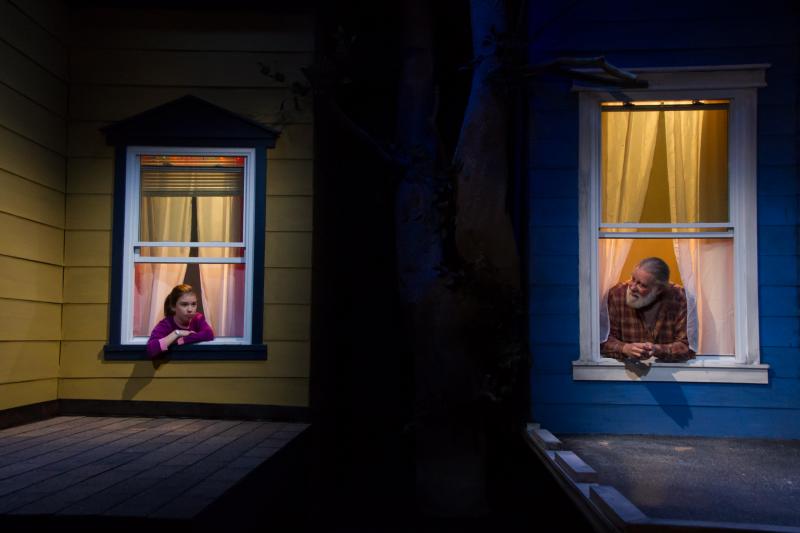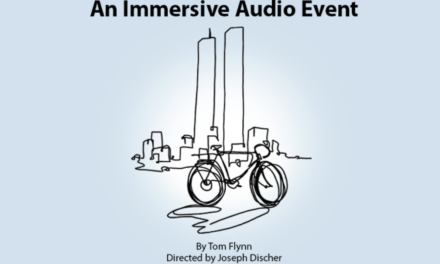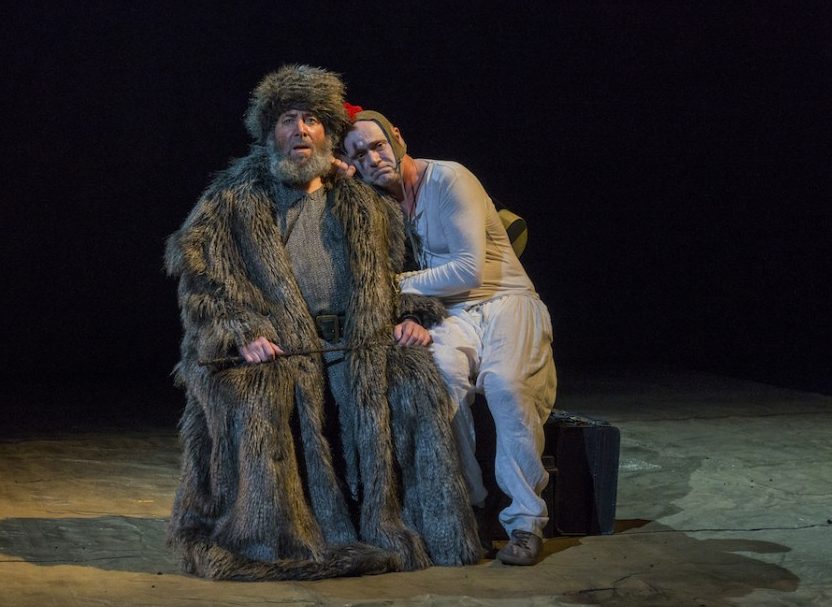“Da,” by the late Irish author, playwright and essayist Hugh Leonard, is more than a memory play about Freudian implications and the primal nature of father-son dynamics. It’s also a history lesson and metaphor for the complex relationships of the Irish with Church and State; “Da” is set in a time when the Irish Catholic Church closely dominated politics and daily life.
This revival of the 1978 Tony and Drama Desk winner for Best Play is smartly directed by Charlotte Moore. It’s by turns funny, tense and poignant. The company has worked together often, which is largely a plus in delivering a seamless performance, but sometimes a minus where too much mutual comfort fails to fuel the flame of truly fiery possibility. The action is contained within a masterful set designed by James Morgan, who uses the small stage to embrace themes of cultural claustrophobia, without sacrificing fluidity of movement.
Ciarán O’Reilly is the world-weary and beleaguered Charlie, who returns to his boyhood home to settle the affairs of his recently deceased father – the Da, played with devilish Irish cunning by Paul O’Brien.
The childless Da and his wife (Fianna Toibin), have adopted and thus rescued the illegitimate Charlie. They strive to do their best for him, but ultimately he’s embarrassed by them, critical that they accept their lot in life without question. Charlie wants more. He doesn’t understand that centuries of conditioning by conquest – by the English and Rome – have fostered a people who cheerfully know their place, don’t seek to rise above their station, and admire their oppressors as “the quality.” Unable to live with such complacent behavior, Charlie is continually frustrated, a condition made keenly palpable by O’Reilly, and later Young Charlie (Adam Petherbridge).
Paradoxically, the Irish are also prone to rebellion and emigration. Charlie is of this ilk. He chafes at the bit for something more, and he finds it in London, thanks to the Da. It is the wily old man who’s seen to it that Charlie meets Drumm, a high-level civil servant, played with pinched exactitude by Sean Gormley, who is Charlie’s gateway to freedom. Charlie mostly stays away, living his life abroad. He returns when his adoptive mother dies, and suggests the old man come live with him in England. When the Da refuses, he’s hurt by the rejection, assuaging himself with sending a monthly check instead.
And thus it is till the Da passes. Charlie has come back to do what’s necessary; he doesn’t want to stay a minute more. He’s paid a condolence call from his childhood pal, Oliver (John Keating), the one who’s stayed behind, resigned to his fate and planted squarely in his comfort zone. In Keating’s persona there’s the air of a man who’s had the wind taken out of him. Oliver is the yin to Charlie’s yang, and it’s clear there’s no longer common ground between the two men.
From that launch point, the Da appears, confirming that time and distance haven’t resolved the complexity of the relationship. The backstory unfolds in well-paced flashback; the ghosts of the Da, Mam, Young Charlie and others reveal all. To Charlie, the Da has been a constant bane, even unwittingly, ruining his first sexual encounter with the easy Mary Tate, “The Yellow Peril” (Nicola Murphy). It’s by luck that Drumm catches Charlie as he’s about to depart for London.
It’s Drumm who’s been charged with giving Charlie his inheritance – an envelope of money and the retirement gift from his former employer (in an earlier scene Mrs. Prynne [Kristin Griffith] presents this, a large paperweight of fused spectacles, to the old man). What was a prized possession to the Da is a worthless eyesore to Charlie, who resents its implications. The final insult of the old man’s legacy is the money: all of the uncashed checks he’d sent over the years. Charlie explodes at this ultimate rejection. In sharp contrast, The Da is completely pleased with himself, reasoning he’s been able to leave his son an inheritance after all.
Conventional wisdom insists a man truly becomes a man when his father dies. There’s no such luxury for Charlie. At the play’s end, the Da’s ghost, ever guileless, yet clever like a fox, decides after all to move to England with Charlie. Despite all efforts to expunge the Da, the son won’t be rid of the father any time soon. The dynamics of father and son, the clash of the old and new, and the complexities of the Irish persona won’t be resolved so easily or so quickly.
Costume Design is by Linda Fisher, Lighting Design by Michael Gottlieb, and Sound Design by Zach Williamson. Hair and Wigs are by Robert Charles-Vallance; Dialect Coach is Steven Gabis, and Production Stage Manager is Pamela Brusoski.
Da by Hugh Leonard, , January 14 through March 8: Tues at 7pm, Wed at 3pm & 8pm, Thu at 7pm, Fri at 8pm, Sat at 3pm & 8pm, Sun at 3pm
The Irish Repertory Theater (at the DR2 Theater), 103 East 15th St., 212-727-2737, www.irishrep.org


